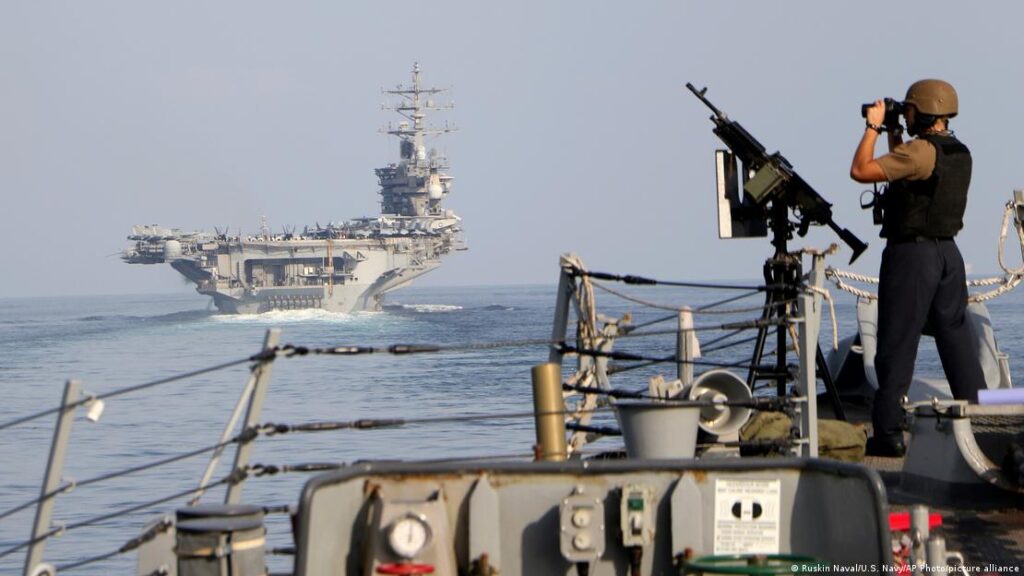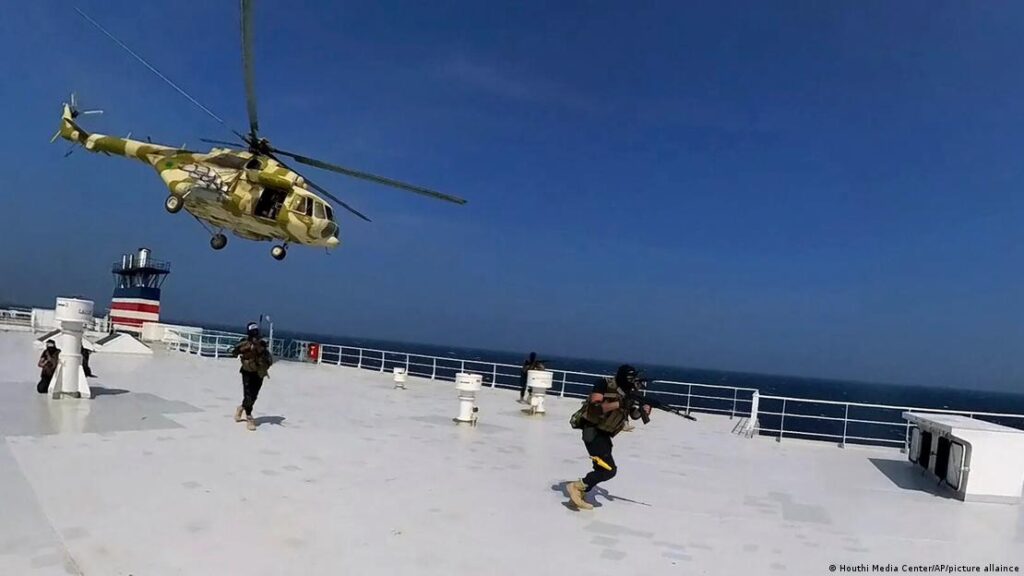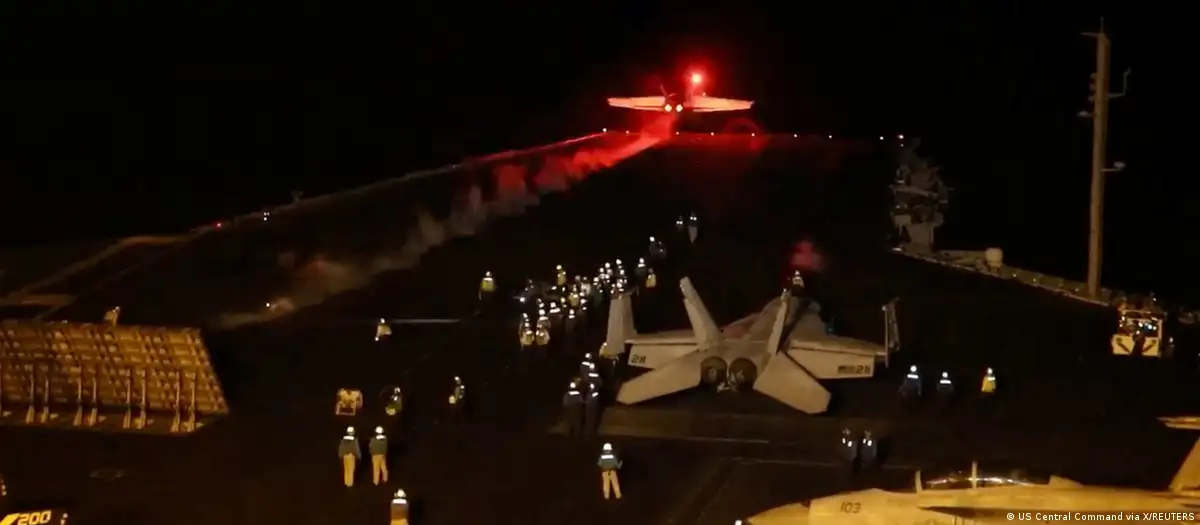A coalition of Americans, British and other countries hit several positions of the Iranian-backed militia. It is the most significant military response to the Houthi attacks on ships in the Red Sea in support of Hamas.
(DW) The United States and some of its allies carried out a series of airstrikes on Thursday night (11/01) against the Houthi militia, which controls part of Yemen, is supported by Iran and has been hitting vessels of different flags in the Red Sea with drones and missiles.
The bombings are the most significant military response to the Houthis’ persistent offensive in the Red Sea, and have raised fears that the conflict between Israel and the Islamic fundamentalist group Hamas in the Gaza Strip will spill over into a regional war in the Middle East – something that US and European Union (EU) diplomacy has been trying to avoid for weeks.
The Houthi attacks on cargo ships take place in solidarity with Hamas, which is also backed by Iran. The rebels have vowed to attack all ships passing through the Red Sea towards Israel.
According to Washington, the Western coalition’s attacks on Thursday in Yemen hit more than 12 locations, including the capital, Sana, and Hudaydah, the Houthi port stronghold on the Red Sea. The targets included Houthi logistics centers, airfields, air defense systems and weapons depots.

What have the US and allies said?
President Joe Biden confirmed the bombings in a statement on Thursday. “Today, at my direction, U.S. military forces – together with the United Kingdom and with support from Australia, Bahrain, Canada and the Netherlands – successfully conducted strikes against a series of targets in Yemen used by Houthi rebels to jeopardize freedom of navigation in one of the world’s most vital waterways.”
US Defense Secretary Lloyd Austin said the action “sends a clear message to the Houthis that they will bear more costs if they do not end their illegal attacks.”
According to Austin, the coalition strikes targeted sites associated with the Houthis’ unmanned aerial vehicles, ballistic and cruise missiles, coastal radars and aerial surveillance capabilities. “The United States maintains its right to self-defense and, if necessary, we will take follow-up action to protect U.S. forces,” he said.
UK Prime Minister Rishi Sunak also confirmed “targeted strikes” carried out by the British air force against Houthi military installations in Yemen.
“Despite repeated warnings from the international community, the Houthis have continued to carry out attacks in the Red Sea, including against US and UK warships this week. This cannot continue. The UK will always defend freedom of navigation and the free flow of trade,” Sunak told the British press on Friday.
What did the Houthis say?
Hussein al-Ezzi, a Houthi official in the Yemeni Foreign Ministry, acknowledged “a massive aggressive attack by American and British ships, submarines and warplanes”.
“The United States and the United Kingdom will undoubtedly have to prepare to pay a high price and bear all the terrible consequences of this flagrant aggression,” he said.
For his part, the group’s military spokesman said that the attacks had killed five Houthi fighters and wounded six others, and that this would not go without “punishment or retaliation”.
Mohammed Abdul-Salam, chief negotiator and spokesman for the Houthis, said that Washington and London “made a fool of themselves with this treacherous aggression”.
“They were mistaken if they thought they could prevent Yemen from supporting Palestine and Gaza,” he said, adding that the Houthi attacks “will continue to affect Israeli ships or those heading for the ports of occupied Palestine”.
However, since the attacks in the Red Sea intensified, the Houthis have also hit ships with tenuous or non-existent links to Israel.
Why are the Houthis attacking ships?
The Houthi militia has stepped up attacks on cargo ships in the Red Sea in support of Hamas in the current conflict against Israel. Hamas is considered a terrorist group by several Western countries, including Israel, the European Union and the United States.
Iran and Israel are enemies who pose a mutual existential threat, compete for regional hegemony and maintain a covert war with cyber attacks, assassinations and sabotage.
Iran leads the so-called “axis of resistance”, a kind of informal alliance made up of Syria, the Lebanese Shiite group Hisbollah, Palestinian factions, Iraqi militias and the Houthi rebels of Yemen, among others.
The civil war in Yemen began in 2014, when the capital Sana was seized by the Iranian-backed Houthi rebels. Since 2015, a coalition led by Saudi Arabia, an ally of Yemen’s internationally recognized government, has been fighting the Houthis, fearing a conflict on its territory. As part of this tension, ships were sporadically attacked in the region, where Somali pirates also operate.
But with the start of the current conflict between Israel and Hamas, attacks on cargo ships have increased exponentially, causing global concern.
The Houthi rebels declared “solidarity” with Hamas and attacked the city of Eilat, in southern Israel, with drones and missiles launched from the south of the Arabian Peninsula. They also began bombing ships in the Red Sea, which bathes part of Yemen’s coast.
The attacks are part of the Houthis’ anti-Semitic and anti-American rhetoric and their hope of gaining wider recognition as part of the Iran-led Axis of Resistance.
The militia presents itself as victims of a conspiracy between Israel, the US and Saudi Arabia, which is why it is popular with part of the Yemeni population.

Which ships are they targeting?
The Houthi militia targets all ships it believes are arriving or leaving Israel. The only cargo ships with free passage in the Red Sea are those carrying humanitarian aid to the Gaza Strip. All others are “legitimate targets of our armed forces,” the group said in a statement.
The Houthi rebels have a significant arsenal of weapons, as well as drones and anti-ship missiles – even a helicopter has been used to hijack an Israeli ship.
According to the White House, more than 50 countries have been affected in 27 attacks on international commercial vessels by the Houthis. Crews from more than 20 countries have been threatened or taken hostage in acts of piracy, according to Washington.
In addition, more than 2,000 ships have been forced to divert their routes to avoid the Red Sea, which can cause weeks-long delays in the transportation of goods. On January 9, the US said that the Houthis had launched their biggest attack to date, directly targeting American ships.
How important is the Red Sea?
To the north of the Red Sea lies the Suez Canal and, to the south, the Bab al-Mandab Strait, which leads to the Gulf of Aden. It is a busy maritime route, where ships transit the Suez Canal to transport goods between Asia and Europe.
Around 10% of world trade passes through the Suez Canal, the shortest link between Asia and Europe. A large part of Europe’s energy supply comes from the Red Sea, as well as foodstuffs such as palm oil and grains, as well as all kinds of products delivered by container ships.
In 2021, a ship stranded in the Suez Canal caused disruption around the world for several days by blocking the passage of other cargo ships.
ek/bl (DW, Reuters, AP, DPA, ots) *** Translated by DEFCONPress FYI Team ***
